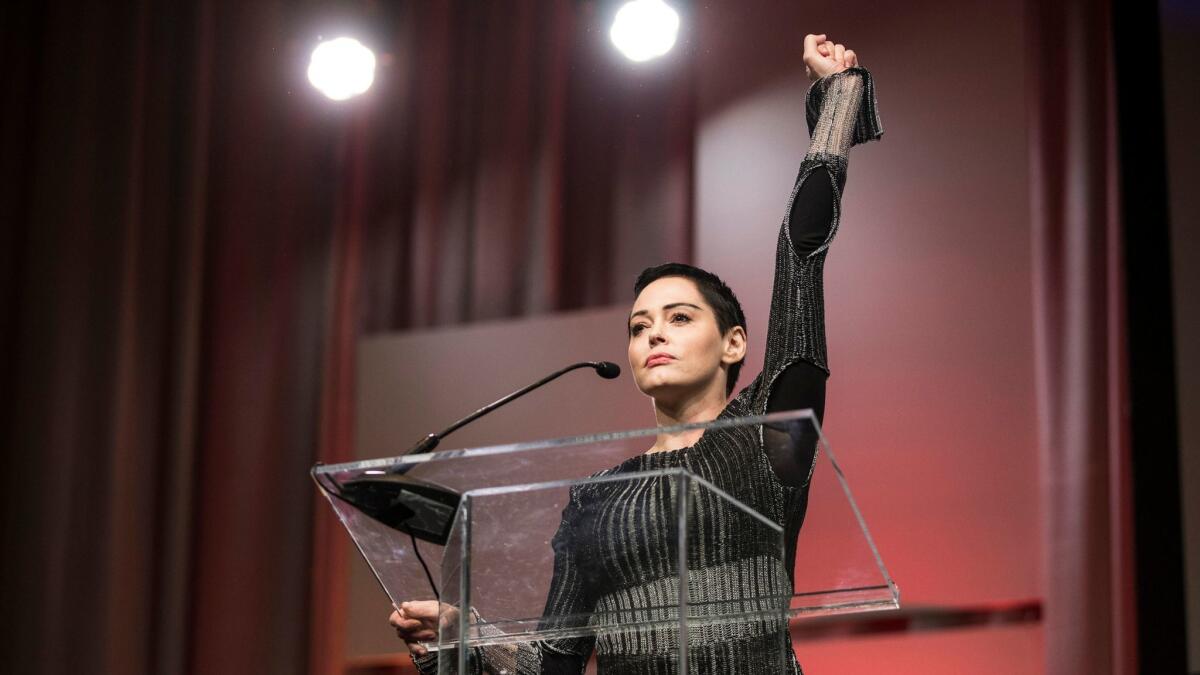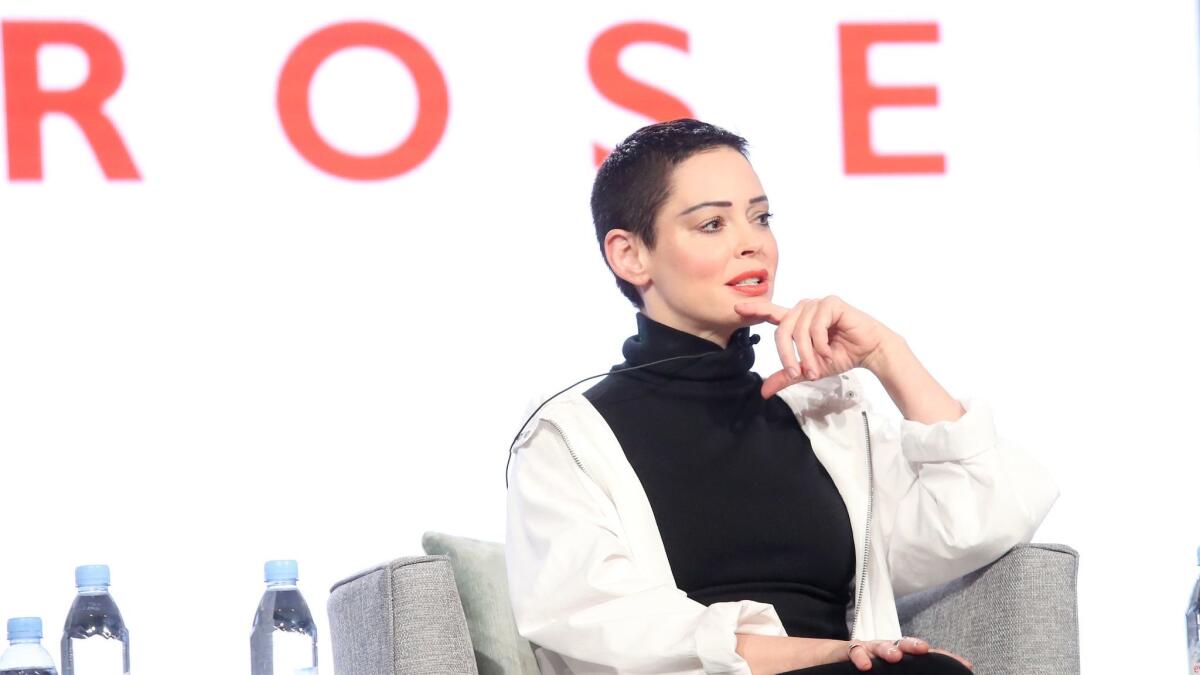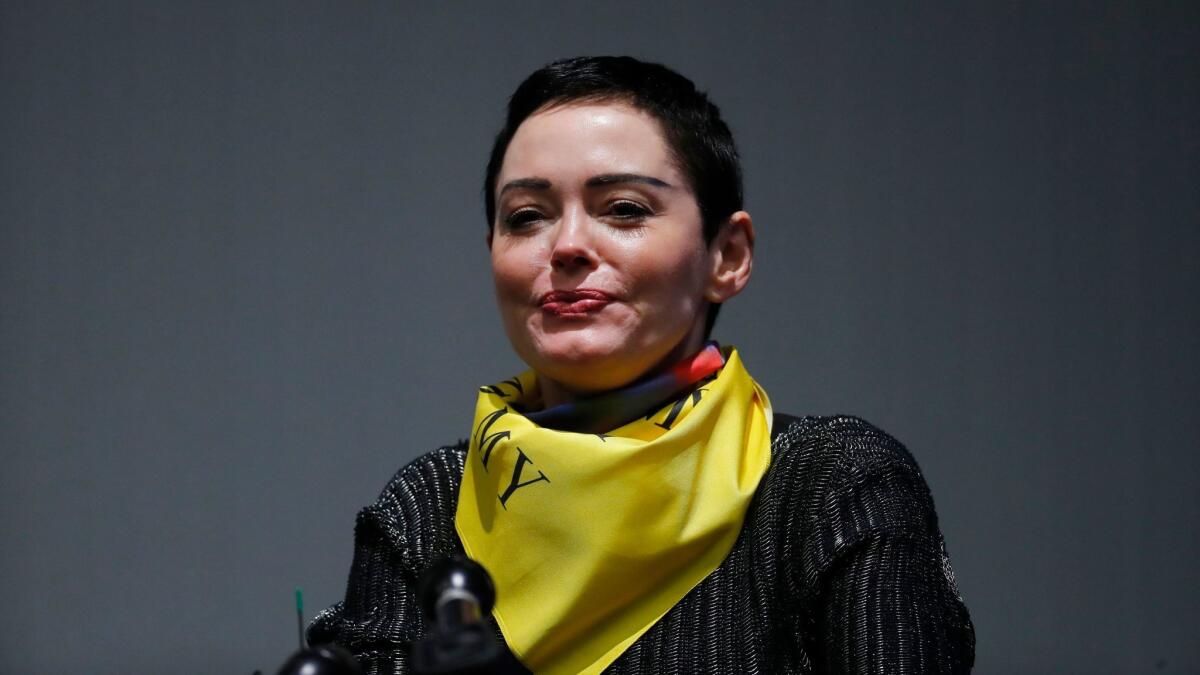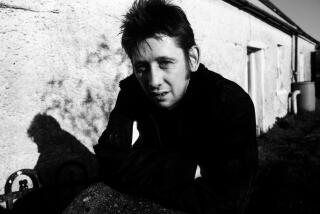Review: In ‘Brave,’ Rose McGowan finally tells her whole story

There is a moment in Rose McGowan’s new documentary series when she learns that Harvey Weinstein has allegedly stolen the first half of her memoir, “Brave,” months in advance of its publication.
“I can’t tell you how violating it felt,” she explains via voice-over. “It was like being back in that room with him all over again, only this time, it was the inside of my mind and not my body.”
Readers of “Brave” will understand why the revelation so enraged McGowan. She does not hold back when writing about Weinstein, whom she refers to only as “The Monster.”
Long before the Weinstein scandal broke, McGowan publicly alleged that she had been raped by a Hollywood producer. After other women came forward with allegations of abuse, McGowan named Weinstein. But “Brave” is the first time she has described the alleged attack. Weinstein has denied the allegations.
Midway through the memoir, the incident occupies an entire chapter called “Death of Self.” At the 1997 Sundance Film Festival, Weinstein invited McGowan to his hotel room for a meeting. Just a few hours before, he had sat behind her at the premiere of her film “Going All the Way,” in which she appeared topless.
Her manager insisted the meeting was important, she writes. “I was so new to the industry’s upper echelon, I didn’t know … what so many already knew, that he was a predator and I was walking into a trap.”
Once she was inside his hotel room, Weinstein offered to show her the hot tub, and before long, she writes, he had pushed her into a steamy room and begun stripping her clothes off. After picking her up and putting her on the edge of the Jacuzzi, she writes, he forced her legs open and performed oral sex on her while masturbating. She pretended to have an orgasm in an attempt to end the experience.
“I did what so many who experience trauma do, I disassociated and left my body. Detached from my body, I hover up under the ceiling, watching myself sitting on the edge of the tub, against a wall, held in place by the Monster whose face is between my legs, trapped by a beast. In this tiny room with this huge man, my mind is blank. Wake up Rose; get out of here.”
The alleged sexual assault was the culmination of years of torment for McGowan, and “Brave” begins at the beginning. Using a brash tone that will be familiar to the millions who follow her on Twitter, McGowan describes her life, starting with the girlhood years she spent in a religious cult (“I was told I was worth nothing in the eyes of God”), the eating disorder she suffered as a teen (“I was never able to get below 92 pounds”), and her decision to legally emancipate herself from her parents at 15.
Still, as she describes her formative years it is clear that McGowan, 44, has always viewed herself as a defiant spirit and still takes pride in the fact that she grew angry over being made to wear a pink smock at school while the boys got blue ones.
That was after her family split from the Children of God. McGowan’s father led the Italian branch and McGowan remembers being forced to declare her acceptance of God, lest she be beaten. When she was 4 a cult elder spotted a wart on her thumb and sliced it off with a razor blade, beginning “a narrative that [messed] with my head for years, that of perfection as self-protection. I told myself if I were just perfect enough, I’d be okay.”
When the cult began promoting sex between children and adults, McGowan’s father decided to leave. After the family returned to America, where they split time between Oregon and Colorado, she felt out of place. Her schoolmates couldn’t understand her odd upbringing and she lashed out, still describing their “proverbial white picket fence” backgrounds as equally dangerous, “a different kind of cult.”
“I’m sure I was unnerving as a child because of my intensity. I know I was because I basically was the same as I am now, and I tend to unnerve people to this day.”
A runaway at 13, McGowan lived for a year on the street. When she returned home, her father demanded $300 a month in rent so she began gigging as an extra for $35 a day. Before long, she’d moved to Hollywood, finding leading roles in movies like “Scream” and “Jawbreaker.” She began dating high-profile men such as Marilyn Manson and director Robert Rodriguez, whom McGowan calls only “RR.”
Her relationship with Manson, though oft-scrutinized in the press, was largely without conflict, blissful even, from her descriptions of Manson “painting watercolors of my Boston terriers while I was ordering glassware from Martha Stewart’s online store.”
This was not the case with “RR,” whom McGowan met at the Cannes Film Festival while the filmmaker was still married. RR was at turns weirdly flattering — “I got you at your ripest,” he told her — and intensely possessive. On the set of “Grindhouse,” McGowan writes, RR would often fly into jealous rages, accusing her of secretly being in love with his collaborator, Quentin Tarantino. Then, after the movie was completed, RR sold it to Dimension Films, a division of the Weinstein Co.
“I can’t tell you what it was like to be sold into the hands of the man who had assaulted me and scarred me for life,” McGowan writes. “I had to do press events with the Monster and see photos of us together, his big fat paw pulling me in to his body.”
(In October, Rodriguez released a lengthy statement saying he was aware of what Weinstein had done to McGowan and purposefully made “Grindhouse” with his company in an effort to make the executive literally pay for what he had done.)
“Grindhouse” was the beginning of the end for McGowan and what she calls the cult of Hollywood. To promote the film, she and costar Rosario Dawson were asked to pose naked on the cover of Rolling Stone in 2007, their bare bottoms touching. When she saw the cover image — her long hair teased voluminously, her pout drawn out with red lipstick — she was horrified.
“Who is that person?” she recalls thinking. “What have they done to you? This is what it’s come to?”
While she admits to being complicit in the creation of this image, she also says the public often misinterpreted why she was showing off her body. When she turned up nearly nude to the 1998 MTV Video Movie Awards with Manson — dressed only in beaded transparent mesh that left her bare breasts and thong underwear exposed — she writes that she was trying to reclaim her body after her recent assault.
Over the past decade McGowan began to cut ties with the industry, even shaving her head to distance herself from the “long, glossy Kardashian-esque” ideal that agents told her would make her desirable to men.
And then she found Twitter. In 2015, McGowan received a casting call for an Adam Sandler movie that urged actresses to wear push-up bras to an audition. She was disturbed by the request, but not surprised by it — so when she posted it on Twitter and the message went viral, she was stunned.
“I realized it was time I finally start some real conversation with the public,” she writes. “I would no longer be silenced.”
Since then McGowan has become one of social media’s leading warriors, calling out what she views as abuses of power in the movie business and encouraging her followers to join the #RoseArmy. The journey has not always been smooth — at moments she has personally attacked even her closest allies, including “Charmed” costar Alyssa Milano and Amber Tamblyn. McGowan has acknowledged she is a work-in-progress — recently tweeting that there is “no map for this road I’m on.”
“Brave” is in part an exploration and explanation of the rage constantly leaking out of McGowan’s pores. But her aim is not to engender sympathy — rather it’s to encourage those feeling disempowered to channel some of her plentiful anger.
“Being angry is okay,” she advises, “no one is going to die if we women let our anger out in healthy ways.”
“Brave”
Rose McGowan
HarperOne: 272 pp., $27.99


Follow me on Twitter @AmyKinLA
More to Read
Only good movies
Get the Indie Focus newsletter, Mark Olsen's weekly guide to the world of cinema.
You may occasionally receive promotional content from the Los Angeles Times.











